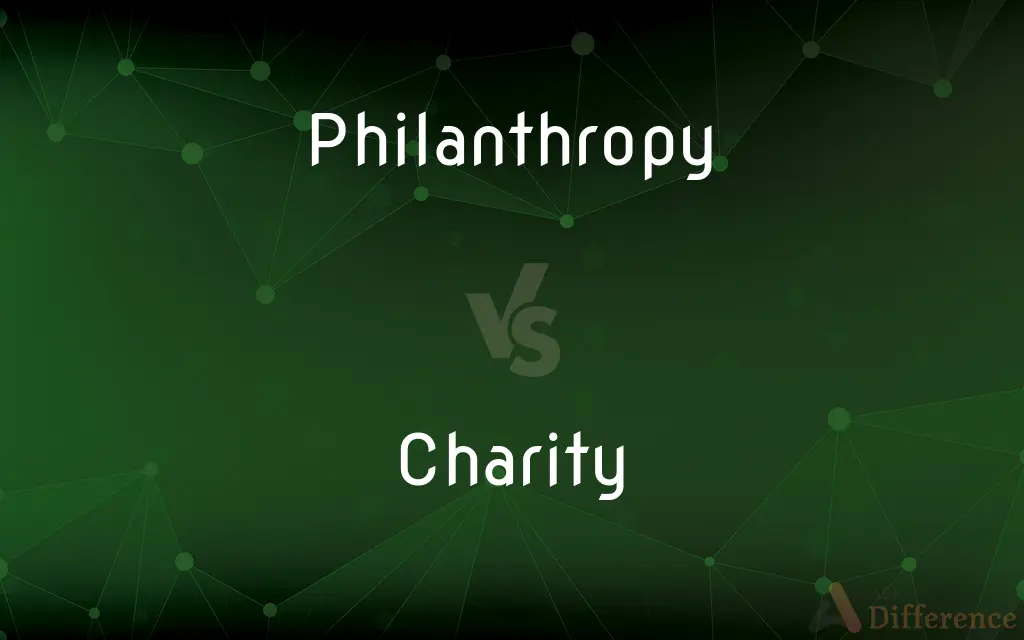Philanthropy vs. Charity — What's the Difference?
Edited by Tayyaba Rehman — By Fiza Rafique — Published on October 19, 2023
Philanthropy is the desire to promote the welfare of others, often through the donation of money to good causes, while Charity focuses on direct relief of suffering or direct aid to those in need.

Difference Between Philanthropy and Charity
Table of Contents
ADVERTISEMENT
Key Differences
Philanthropy and Charity are terms that both refer to acts of giving and kindness. However, they denote slightly different approaches and intentions in the world of giving. Philanthropy, derived from the Greek words for "love of humanity," often encompasses a broader approach to improving society. It usually involves large-scale efforts, tackling root causes of problems, and implementing solutions that bring about systemic change. For example, philanthropy might fund educational programs to improve literacy rates.
Charity, on the other hand, tends to focus on immediate relief. It addresses urgent needs and provides direct assistance to individuals or groups in distress. For instance, after a natural disaster, charitable organizations may provide immediate food, shelter, and medical aid to those affected. Such acts are crucial, as they offer timely support to those in dire situations.
Moreover, philanthropy often operates with a long-term vision, considering the future impact of actions and aiming for sustainable change. A philanthropist might establish an endowment for ongoing research in a particular field. In contrast, charity primarily provides short-term solutions to pressing issues. It answers immediate calls for help, like feeding the hungry or clothing the cold.
To encapsulate, while both philanthropy and charity are commendable acts of generosity and care, philanthropy leans more towards strategic, long-term interventions, and charity emphasizes direct, immediate relief. Regardless of the distinctions, both play crucial roles in creating a more compassionate and just world.
Comparison Chart
Nature
Strategic, addressing root causes
Direct aid, addressing immediate needs
ADVERTISEMENT
Duration of Impact
Long-term solutions and systemic change
Short-term relief
Focus
Broader societal improvements
Direct relief to individuals or groups
Scope
Can be large-scale projects and initiatives
Often smaller-scale, immediate actions
Example
Funding research or educational programs
Providing food and clothing to the needy
Compare with Definitions
Philanthropy
Generous acts or donations to aid humanity.
The museum was built through the philanthropy of a few dedicated individuals.
Charity
Voluntary giving to those in need.
The charity event raised funds for the local children's hospital.
Philanthropy
Large-scale efforts to improve society.
Philanthropy plays a key role in eradicating diseases worldwide.
Charity
Immediate relief of suffering.
After the hurricane, many charity groups provided emergency aid.
Philanthropy
Giving that addresses the root causes of issues.
Through philanthropy, some organizations aim to tackle the root causes of poverty.
Charity
An organization set up to provide help to the needy.
She volunteers at a charity that helps homeless animals.
Philanthropy
Efforts aiming for long-term societal change.
Her philanthropy focuses on creating sustainable clean water systems.
Charity
Benevolent goodwill toward humanity.
Acts of charity can be seen in everyday kindnesses.
Philanthropy
The desire to promote the welfare of others.
Bill Gates is known for his philanthropy, especially in the field of health and education.
Charity
Provision of help or relief to the poor; almsgiving.
Philanthropy
The effort or inclination to increase the well-being of humankind, as by charitable aid or donations.
Charity
Something given to help the needy; alms.
Philanthropy
Love of humankind in general.
Charity
An institution, organization, or fund established to help the needy.
Philanthropy
Something, such as an activity or institution, intended to promote human welfare.
Charity
Benevolence or generosity toward others or toward humanity.
Philanthropy
Benevolent altruism with the intention of increasing the well-being of humankind.
Charity
Indulgence or forbearance in judging others.
Philanthropy
(uncountable) Charitable giving, charity.
As public funding is reduced, we depend increasingly on private philanthropy.
Charity
Often Charity(Christianity) The theological virtue defined as love directed first toward God but also toward oneself and one's neighbors as objects of God's love.
Philanthropy
(countable) A philanthropic act.
His tombstone lists his various philanthropies.
Charity
(countable) An organization, the objective of which is to carry out a charitable purpose.
Philanthropy
(countable) A charitable foundation.
The Rockefeller philanthropies
Charity
(countable) The goods or money given to those in need.
Philanthropy
Love to mankind; benevolence toward the whole human family; universal good will; desire and readiness to do good to all men; - opposed to misanthropy.
Charity
(uncountable) Benevolence to others less fortunate than ourselves; the providing of goods or money to those in need.
Philanthropy
Voluntary promotion of human welfare
Charity
In general, an attitude of kindness and understanding towards others, now especially suggesting generosity.
Charity
Christian love; representing God's love of man, man's love of God, or man's love of his fellow-men.
Charity
Love; universal benevolence; good will.
Now abideth faith, hope, charity, three; but the greatest of these is charity.
They, at least, are little to be envied, in whose hearts the great charities . . . lie dead.
With malice towards none, with charity for all.
Charity
Liberality in judging of men and their actions; a disposition which inclines men to put the best construction on the words and actions of others.
The highest exercise of charity is charity towards the uncharitable.
Charity
Liberality to the poor and the suffering, to benevolent institutions, or to worthy causes; generosity.
The heathen poet, in commending the charity of Dido to the Trojans, spake like a Christian.
Charity
Whatever is bestowed gratuitously on the needy or suffering for their relief; alms; any act of kindness.
She did ill then to refuse her a charity.
Charity
A charitable institution, or a gift to create and support such an institution; as, Lady Margaret's charity.
Charity
Eleemosynary appointments [grants or devises] including relief of the poor or friendless, education, religious culture, and public institutions.
The charities that soothe, and heal, and bless,Are scattered at the feet of man like flowers.
Charity
A foundation created to promote the public good (not for assistance to any particular individuals)
Charity
A kindly and lenient attitude toward people
Charity
An activity or gift that benefits the public at large
Charity
Pinnate-leaved European perennial having bright blue or white flowers
Charity
An institution set up to provide help to the needy
Charity
Kindness and tolerance in judging others.
It's important to look at others with charity and understanding.
Common Curiosities
Are philanthropy and charity the same?
No, while both involve giving, philanthropy often focuses on long-term solutions, while charity provides immediate relief.
Can small donations be considered philanthropic?
Yes, the scale of donation doesn't define philanthropy; the intent and impact do.
Which is better: philanthropy or charity?
Neither is universally "better"; both play essential roles in addressing societal needs, just in different ways.
Do charities only provide financial aid?
No, charities can offer various types of support, from financial aid to services, goods, or even emotional support.
How can one start with philanthropy?
One can begin with identifying a cause they're passionate about and researching how to best contribute to that cause.
Can charity create long-term impact?
Yes, while charity often focuses on immediate relief, its effects can sometimes lead to longer-term improvements.
How can I ensure my philanthropic efforts have an impact?
Research, collaboration with experts, and monitoring and evaluation can help ensure effective philanthropy.
Can a person be involved in both philanthropy and charity?
Absolutely, many individuals and organizations engage in both philanthropic and charitable activities.
Are all charitable acts philanthropic?
Not necessarily. While all philanthropic acts are charitable in nature, not all charitable acts are considered philanthropic.
Can businesses engage in philanthropy?
Yes, many businesses have philanthropic initiatives or partner with charitable organizations.
Why do people give to charity?
Reasons vary, including compassion, a desire to make a difference, religious beliefs, and personal experiences.
What's a common aim of philanthropy?
Philanthropy often aims to create systemic change and address the root causes of societal problems.
Are all acts of kindness considered charity?
Acts of kindness embody the spirit of charity, but charity often refers to more organized or tangible forms of aid.
Is philanthropy only about money?
No, philanthropy can involve time, expertise, resources, and other non-monetary contributions.
How can one choose a trustworthy charity?
Researching organizations, checking their financials and transparency, and reading reviews can help identify trustworthy charities.
Share Your Discovery

Previous Comparison
SDK vs. Framework
Next Comparison
Nuclear Charge vs. Effective Nuclear ChargeAuthor Spotlight
Written by
Fiza RafiqueFiza Rafique is a skilled content writer at AskDifference.com, where she meticulously refines and enhances written pieces. Drawing from her vast editorial expertise, Fiza ensures clarity, accuracy, and precision in every article. Passionate about language, she continually seeks to elevate the quality of content for readers worldwide.
Edited by
Tayyaba RehmanTayyaba Rehman is a distinguished writer, currently serving as a primary contributor to askdifference.com. As a researcher in semantics and etymology, Tayyaba's passion for the complexity of languages and their distinctions has found a perfect home on the platform. Tayyaba delves into the intricacies of language, distinguishing between commonly confused words and phrases, thereby providing clarity for readers worldwide.














































